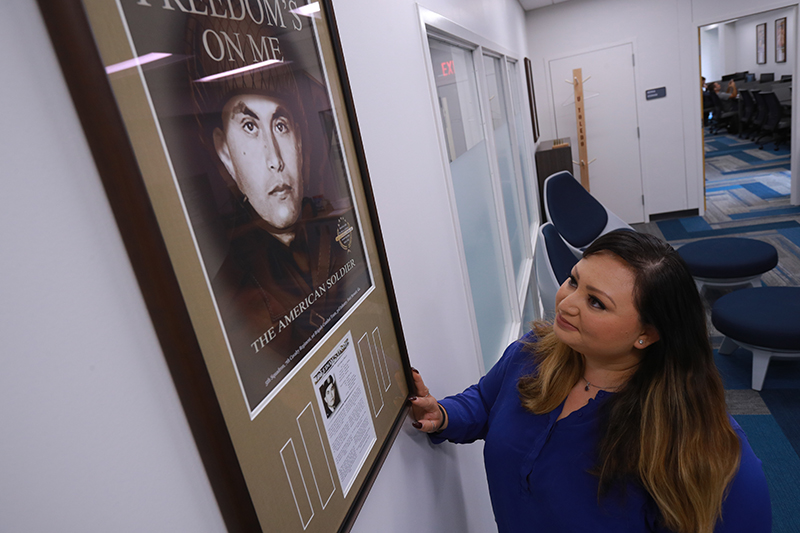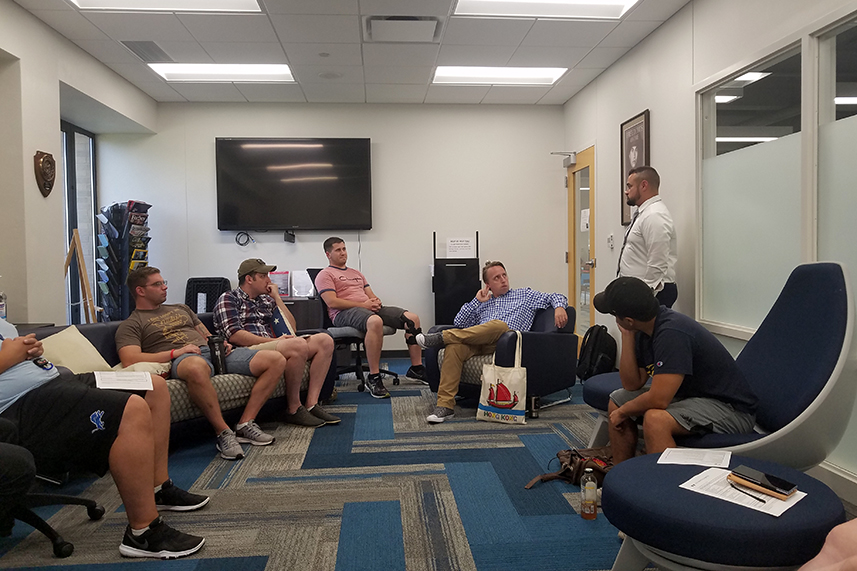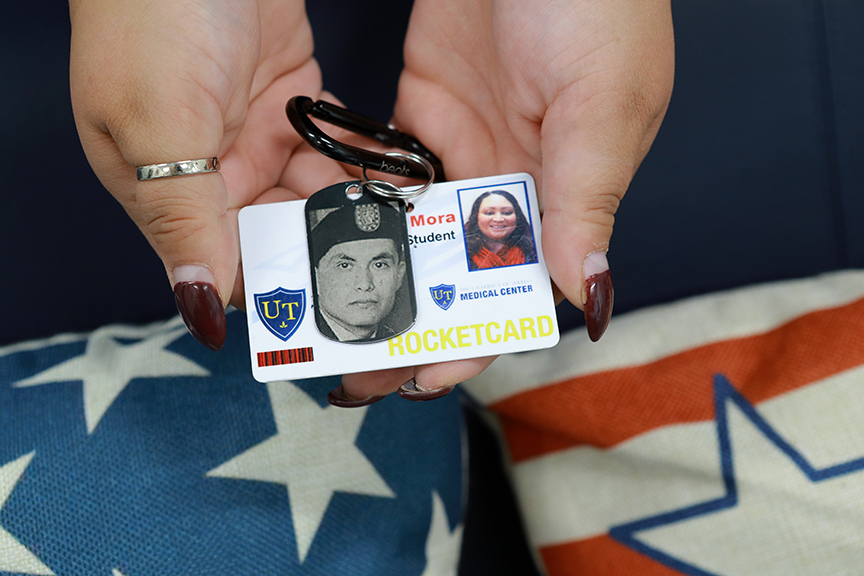Finding fraternity at UT
Veterans, Gold Stars carry on and remember the fallen
By Laurie B. Davis

Photo by Dan Miller
She’s a Gold Star, a survivor of a loved one who paid the ultimate price in service to the country. Mora is a Gold Star wife. Her husband, Arthur, was killed by an IED on a convoy mission on Oct. 19, 2005, while serving in Operation Iraqi Freedom. The 23-year-old soldier was accompanied in the convoy by three other men; two others also died in the explosion.
At the time of his death, she was raising their 4-year-old daughter, Olivia, their 17-month-old daughter, Celina, and their 8-day-old newborn son, Christopher. “You’re already hormonal after the birth of a child and then you throw in the loss of your spouse; it was devastating. You wake up and you hope what is happening is all in your head, and then you go downstairs and there are tears everywhere, and you know that it’s true,” says Mora. It was the beginning of a long road through the grief.
“I do my best to represent the Gold Star community on campus,” says Mora, who began her communication degree in December 2014. “They shouldn’t be forgotten. We’ve suffered a tremendous loss.” She has met many other Gold Stars across the country through community service projects and programs that honor Gold Star survivors, but she thinks she may be the only Gold Star on UT’s campus.
Mora has made many friends and acquaintances through the UT Chapter of the Student Veterans of America, University College’s Military Service Center and by visiting the Lt. Col. Thomas J. Orlowski ’65 Veterans Lounge located in the William S. Carlson Library and named for the late Thomas J. Orlowski. These organizations offer support to all UT military vets and active duty students and their families. The lounge is a place where vets can feel welcome and among comrades.
“I feel that I’ve truly been embraced by the UT community, especially the veteran community,” says Mora.
UT recently was recognized by the Military Times as a Best for Vets school for supporting student veterans. The publication ranks colleges through its annual survey — a comprehensive school-by-school assessment of veteran and military student services and rates of academic achievement — as well as a detailed review of public data collected by federal agencies.
“We are happy to help our service men and women who enroll at The University of Toledo, and this Best for Vets designation recognizes our commitment,” says Dr. Barbara Kopp Miller, dean of University College. “It is an honor to help our veterans succeed.”
UT is among 208 schools receiving the Best for Vets 2019 designation, according to Military Times.
In 2017, UT was nationally recognized as the first university campus in the country to simultaneously honor all service members of the armed forces and their relatives (Blue Stars), as well as the family members who lost a loved one who died in service to the United States (Gold Stars). UT dedicated both a Blue Star Memorial marker and Gold Star Memorial marker, which are part of the Veterans’ Plaza on the northwest corner of Centennial Mall on Main Campus.
KEEPING IT STRAIGHT
Richard “JR” Miazga an alumnus and veteran, also found camaraderie and support through UT’s many military-friendly services and benefits. Like Mora, he joined the Student Veterans of America, UT Chapter.
Miazga, at age 18, enlisted in the United States Navy and served on active duty from 2000 to 2004. In 2005, he joined the Air Force Reserves for the next 12 years. As part of active duty in the Navy, Miazga was on an aircraft carrier and an amphibious marine ship, cruising the Persian Gulf to keep the peace, he says. Among his deployments, which included four while he was a reservist, he traveled to Al Asad and Baghdad, both in Iraq, as well as Kyrgyzstan and Oman.Miazga started at UT in 2009 as an undecided student while working full-time as a journeyman electrician, experience he acquired in the Navy. “I topped out as a journeyman and became a foreman, but that’s not where my heart was. I enjoyed the numbers,” he says, which is why he eventually chose to major in accounting in the College of Business and Innovation.
Even while in Iraq as a reservist, Miazga took online classes. “I remember Dr. [Anthony] Holder gave me some leeway because I was deployed at the time.” Miazga says Holder understood that the possibility of losing access to the internet while deployed overseas in a war zone was very real, and Holder, assistant professor of accounting, was willing to extend an assignment due date if necessary.

Recently, Miazga returned to campus to speak with members of UT’s Student Veterans of America in the veterans lounge. He talked about the transition from classes to career. “I talked to them about some of my struggles and how to keep your head above water and be goal- oriented. In a society where at times things like alcohol and parties can get in the way of your academic success, it’s important to keep your head down and continue to move forward, and continue to feel like you’re achieving something. I think employers are very receptive to a hard-working student who is also a veteran,” says Miazga. He says giving back to one’s community also is important. “If a community is willing to support a veteran, then that local veteran should be turning around and helping that community.”
KEEPING A LEGACY ALIVE
Since taking on school full-time, Mora, who now is raising two other children with her current partner, has had to give up some of her volunteer work. She had volunteered at the Toledo Veterans Affairs Clinic and at Veterans Matter, where she did some grant writing and acquired a love of public relations. But Mora also has turned her grief into giving. “Every year in honor of Art’s death, we [Mora and her children] do a random act of kindness for a non-profit or a family we know, and we’ve been doing that since 2007,” she says. “It could be bringing hundreds of pounds of dog food to a local dog shelter, or donating funds to a non-profit, or going to a restaurant and covering someone’s bill. We do something kind on that day that was so unkind to us.”
Mora also prioritizes keeping her late husband’s memory alive, especially with her children, who have grown since their father died. Olivia is now 17 and a junior at St. Ursula Academy; Celina, is a 14-year-old freshman at Perrysburg High School; and Christopher is in seventh grade at Perrysburg Jr. High School.

Photo by Dan Miller
Art Mora’s image travels with his family. The Mora children are active in sports and each has a button with a photo of their dad on a gym bag. “That’s how their dad goes to their games,” says their mom, who carries his photo on her Rocket Card. “There are times when it’s tough, and I look at his picture and remember the end-goal: this is helping our family.” The end goal for Mora is to do communications work for a federal agency and support her children.
And Mora is only about three semesters away from earning her bachelor’s degree, which she intends to follow with a master’s. Her excitement about her future graduation is as large as her enthusiasm was when she first received her Rocket Card. “Man, the state of Ohio will hear that scream when I walk across that stage. This has been a journey!”







